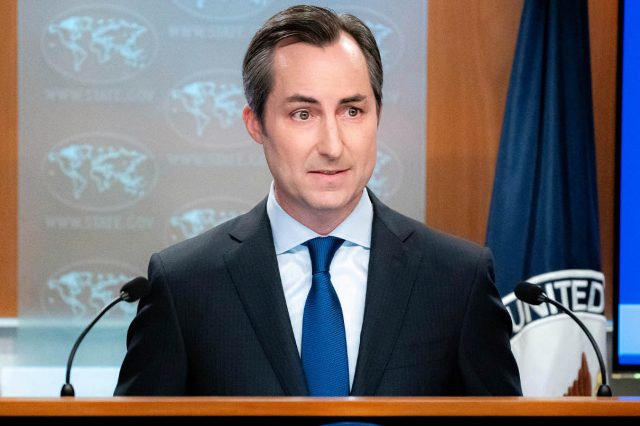|
U.S. State Department Spokesperson Matthew Miller spoke at the daily press briefing. Regarding the ongoing clashes between the Assad regime forces and anti-regime armed groups since November 27, Miller stated, "What we want to see is a reduction in tensions, the protection of civilians and minority groups, but our overall policy remains the same. We want to see a serious and credible political process that will definitively end this civil war for everyone." Pointing to UN Security Council (UNSC) Resolution 2254, adopted in 2015 to promote a political process aimed at ending the civil war in Syria, Miller expressed hope that every country with influence over the Syrian regime would strive for the Assad regime to initiate a political process by engaging in dialogue with its own people and fully implement the UN resolutions that would prevent the continuation of the civil war. "ASSAD IS A CRUEL DICTATOR WITH THE BLOOD OF HIS PEOPLE ON HIS HANDS"Miller described Syrian President Bashar Assad as "a cruel dictator with the blood of innocent civilians in Syria, his own people, on his hands. As a result, what we want to see is a political process moving forward, but one in which the Syrian people can determine who their leaders are." In the western countryside of Aleppo province in northern Syria, clashes began on November 27 between the Assad regime forces and anti-regime armed groups, with the anti-regime armed groups rapidly advancing towards the center, capturing a large part of the center by November 30. While the armed groups continued their advance, Foreign Minister Hakan Fidan stated in a phone call with U.S. Secretary of State Antony Blinken on December 1 that the political process between the regime and the opposition must conclude for peace and tranquility to be established in Syria, emphasizing that they would never allow terrorist activities against Turkey and Syrian civilians.  U.S. State Department Spokesperson Matthew Miller. U.S. State Department Spokesperson Matthew Miller."WE DO NOT WANT TO SEE A VIOLATION OF THE CEASEFIRE IN LEBANON"Answering questions about whether the ceasefire reached between Israel and Lebanon on November 27 continued despite Israel's violations, Miller argued that they have seen the ceasefire as "successful" since it came into effect. He assessed that, overall, they could say that "the ceasefire has been successful in stopping the conflicts." Regarding potential violations of the ceasefire, Miller emphasized that they have established an open mechanism for interaction with Israel and the Lebanese army, in collaboration with France, to address this issue. He noted that they anticipated some violations could occur, especially in the first week of such a fragile ceasefire. Miller stated, "As a result, we do not want to see a violation of the ceasefire, and so far, we have not seen it. When we receive reports of potential violations through the mechanism we established, we will investigate them and then communicate with the parties to ensure they do not happen again." The Israeli army announced that it had launched attacks on Lebanon today, despite the ceasefire established on November 27. The number of violations by the Israeli army since the ceasefire agreement came into effect on November 27 has risen to at least 73, resulting in the deaths of 2 people and injuries to 6 others.
|